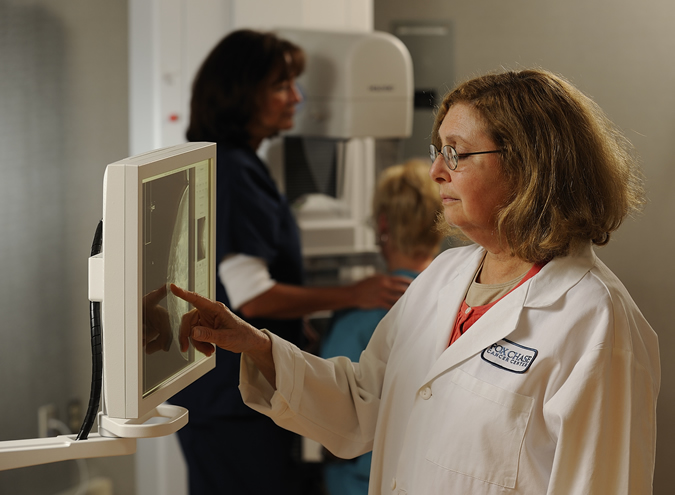
PHILADELPHIA (October 3, 2016) – October is Breast Cancer Awareness month, a time to celebrate more than 2.8 million American breast cancer survivors. Fox Chase Cancer Center reminds women of the importance of breast cancer screenings. “Regular screenings and mammograms can help detect breast cancer in its early stages, when it is most successfully treatable,” said Kathryn Evers, MD, director of mammography at Fox Chase Cancer Center. “Today’s various treatment options and less extensive surgery ultimately translate into better outcomes for patients.”
In 2016, about 40,450 women will die from breast cancer, according to the American Cancer Society. Breast cancer is the second leading cause of cancer death in women behind lung cancer. A woman’s chance of dying from breast cancer is approximately 1 in 36, or about 3%.
Risk Factors
The main risk factors for breast cancer are being a woman, getting older (most breast cancers are diagnosed in women after age 50), and having changes in certain breast cancer genes (BRCA1 and BRCA2). Other uncontrollable factors that may increase risk include personal/family history, race, breast density and menstrual period history.
Certain risk factors are lifestyle-related and may be controlled. These include the use of birth control pills, hormone therapy after menopause and having children. Drinking alcohol, being overweight or obese and physical exercise are also factors.
“Having a risk factor doesn’t mean a woman will develop breast cancer,” said Evers. “Many women never develop the disease despite an increased risk, while others who show no apparent risk factors may be diagnosed with breast cancer.”
Signs and Symptoms
“Breast cancer symptoms vary among individuals. Some women experience warning signs while others have none,” said Evers. “All women should be familiar with how their breasts normally look and feel and immediately report anything unusual or worrisome to their physician.”
- Lump in the breast or underarm (armpit)
- Swelling or thickening of all or part of the breast
- Dimpling or skin irritation of breast skin
- Localized, persistent breast painRedness or flaky skin in the nipple area or breast
- Nipple discharge (other than breast milk)
- Any change in the size or shape of the breast
Breast Cancer Screening
“We typically use three tests to screen for breast cancer. Women should consult with their physician to determine what is right for them,” Evers noted.
- A mammogram is an x-ray exam of the breast used to detect and evaluate breast changes. Its detection ability depends on tumor size and breast tissue density.
- Three-dimensional (3D) mammography is a type of digital mammography in which x-ray machines are used to take pictures of thin slices of the breast from different angles and computer software is used to reconstruct an image.
- Breast ultrasound is often used along with mammography for high-risk women and women with dense breast tissue.
- A breast MRI (magnetic resonance imaging) may be used to screen high-risk women and gather more information about a suspicious area found on a mammogram or an ultrasound.
The American Cancer Society recommends:
- Women at high risk for breast cancer based on certain factors should get a mammogram and an MRI every year.
For women at average risk:
- Women ages 40 to 44 should have the choice to start annual breast cancer screening with mammograms if they wish to do so. The risks of screening and potential benefits should be considered.
- Women ages 45 to 54 should get mammograms every year.
- Women age 55 and older should switch to mammograms every 2 years, or have the choice to continue yearly screening.
Screening should continue as long as a woman is in good health and is expected to live 10 more years or longer.
Fox Chase offers a Risk Assessment Program for individuals and families concerned about their risk for certain types of cancer. To learn more, visit FoxChase.org.